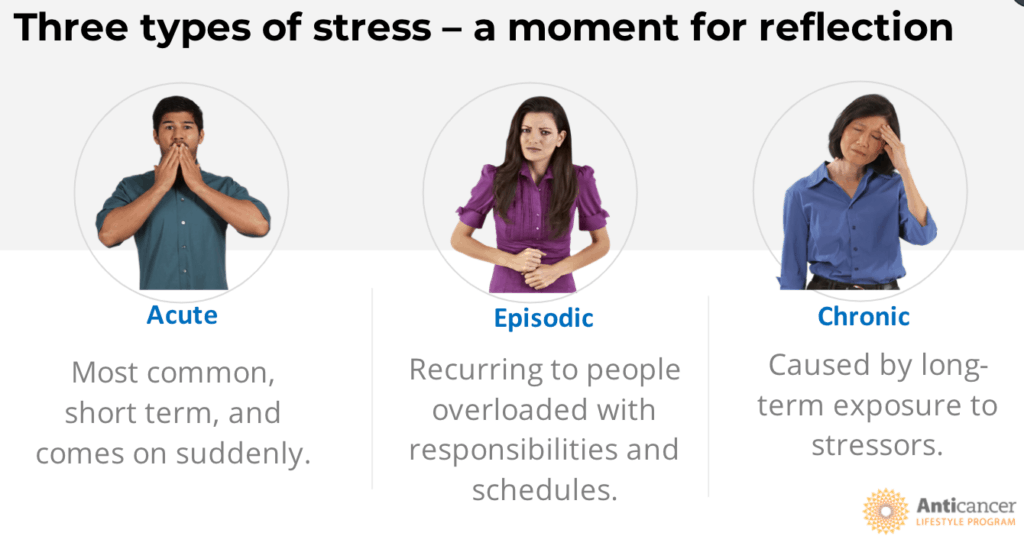Stress is something that everyone experiences.
Stress is a state of emotional strain or tension caused by demanding circumstances. However, problems do start to show up when too many stressors pile up and you lack the means of coping, or with the ability to put things into perspective. The resulting sense of overwhelm can create feelings of helplessness and despair.
“Your ability to make and maintain lifestyle choices that promote health and well-being starts with learning to manage your stress.”
Different Types of Stress and How they Affect Your Body
Acute Stress
Acute stress is the most common type of stress. It comes on suddenly and lasts for a short time. Some types of acute stress are what some people also refer to as an adrenaline rush. It can be exciting in small doses. However, most of the time when people experience acute stress it is unpleasant. For example, let’s use Miguel as an example. If Miguel is walking down the sidewalk and smells smoke, then looks up and sees a building on fire, his heart will start racing, he may start to sweat and feel a sense of panic. Miguel may feel worried and scared and unsure of what to do. Thoughts start racing in his head. “What should I do first?” “Should I go into the building to rescue someone?” “Should I warn the neighbors to evacuate?” “Should I call 9-1-1-?”
This is the perfect example of someone who is experiencing Acute Stress.
Episodic Stress
Episodic Stress is a type of stress that happens frequently. People who experience this type of stress are often those who overload their schedule, take on too many responsibilities, and then find themselves unable to fulfill their commitments. Episodic stress is common in those who frequently worry about all the things that could go wrong, and who fear the loss of control.
For example, let’s consider Marcy. Marcy’s mother and grandmother died from breast cancer, so she is very careful to get checked annually. Every year, when she has a cancer screening test, her anxiety level shoots up as she waits for the scan report from her doctor. Marcy always imagines the worst, trying to prepare herself for bad news. Her muscles tense, she paces, and she can’t concentrate on anything else. She knows it may be several days until she learns the results of her scan. She doesn’t want to go to work, she doesn’t want to be social with her friends, and her heart jumps every time the phone rings.
Chronic Stress
Chronic stress is caused by long-term exposure to stressors, such as a horrible job, a critical boss, a chronic illness, or relationship conflict. These challenging situations can seem like they will never end and the built-up stress that results can be physically and emotionally harmful. Chronic stress occurs when it’s difficult to see a way out of a challenging situation or to see a solution. People tend to adapt to chronic stress over time, It can become slowly woven into everyday life, which often means its health impacts go unnoticed.
Take Shawna for instance. Shawna worries constantly about her adult son. He has a history of making poor choices in his life that land him in some sort of trouble. Shawna has had to drop everything to help her son out of difficult, and sometimes dangerous, situations. She’s tried to talk to him about his poor choices, but the two of them always end up in an angry argument. Shawn loves her son, and wants to help him improve his life, but she doesn’t know what else she can do.
Each of these situations triggers a certain type of stress response. Can you remember situations when you felt the same way? Maybe you didn’t recognize your reactions as stress at the time, but your body knew, and responded. Let’s take a closer look at how stress affects your body.
Understand the Mind-Body Connection
Your body is programmed to respond to stress.
Any stressful situation, like worrying about losing your job, waiting for that CT scan result, or running into a rattlesnake, can trigger the amygdala–the part of your brain that tells your body to release hormones in response to stress.
When stress-related hormones such as cortisol and adrenaline are released into your bloodstream, your heart may start to pound, and you may start to sweat. You get a surge of energy and your mind becomes hyper-focused. Sight, hearing, and other senses become sharper. It can take anywhere from half an hour to a couple of days to return to your normal resting state.
Fight, Flight or Freeze Response
Physical stress reactions are known as the fight, flight or freeze response. Humans rely on this automatic response to get out of danger. This reaction evolved from an early survival mechanism that allowed humans to respond quickly when faced with life-threatening situations. If a predator such as a bear appeared, the fight, flight or freeze response allowed humans to act quickly. They could either run away, hide, or freeze until the animal was gone–or fight off the predator. This response is normal and happens automatically, and is useful during life or death emergencies.
By raising your blood pressure and heart rate, your body is preparing your muscles to get ready to fight or to run away. As your stress hormone levels go up, your body starts to turn off or slow down the body parts that aren’t immediately needed during an emergency. This process causes more energy to flow to the parts that allow you to fight or take flight, including your lungs, leg, and arm muscles. Your immune system function is one of the body systems that can slow down when stress related hormones like cortisol are released. Cortisol can also impair executive functioning – which is your ability to make complex, reasoned decisions.
If you spent too much time thinking about what to do when you saw a bear, you wouldn’t react in time to avoid being attacked. Your body is very good at turning on your fight or flight response when you’re in danger, however, your body isn’t always able to determine which stressful events are truly dangerous, and which are just part of living in today’s fast-paced world. In fact, there’s a good chance that most of the stress you experience is not actually related to life-threatening situations. The stress you feel when you’re stuck in traffic may cause your body to have the same type of response and an increase in stress hormones as if you were being chased by a bear.
Frequent Stress and Impact on Health
Frequently repeated stress responses or long periods of stress can cause your body to be in a state of chronic stress reaction that will affect your health over time. Stress can cause us to sabotage our best intentions to live a healthy life. When your fight or flight reaction is automatically triggered over and over again, that is when your stress reaction becomes chronic.
Chronic stress can raise your risk of engaging in unhealthy coping behaviors, ones that are self-destructive, addictive, numbing, or distracting. Everything from excess drinking to aggressive driving to downing a few donuts at work–these are behaviors that in the short-term can help to dull or distract you from your stress. The destructive behaviors that can result from chronic stress can also trigger an inflammatory response from the body. Prolonged inflammation can have a wide range of physical effects such as fatigue, joint or abdominal pain, mouth sores, as well as emotional and mental consequences such as depression.
In a chronic stress situation, you are also at greater risk of sleeplessness and exhaustion, heart attack and even cancer. There is a growing body of research that links chronic stress to tumor growth and spread. Continuous release of stress hormones, such as cortisol and norepinephrine, creates an inflammatory “terrain” in your body that allows cancer cells to thrive.
Conclusion
In summary, the mind and body are deeply interconnected. Each person experiences the relationship between the mind and body slightly differently, but that relationship exists for everyone. An unregulated stress response can lead to chronic inflammation, which can increase your risk of many different illnesses and diseases. Therefore, learning to manage your stress response is key to creating a healthy internal terrain that will lower your likelihood of many illnesses, including cancer. Please see our Anticancer Mindset module for tips and tools you can use to manage your stress.



 Margaret Fletcher
Margaret Fletcher 


